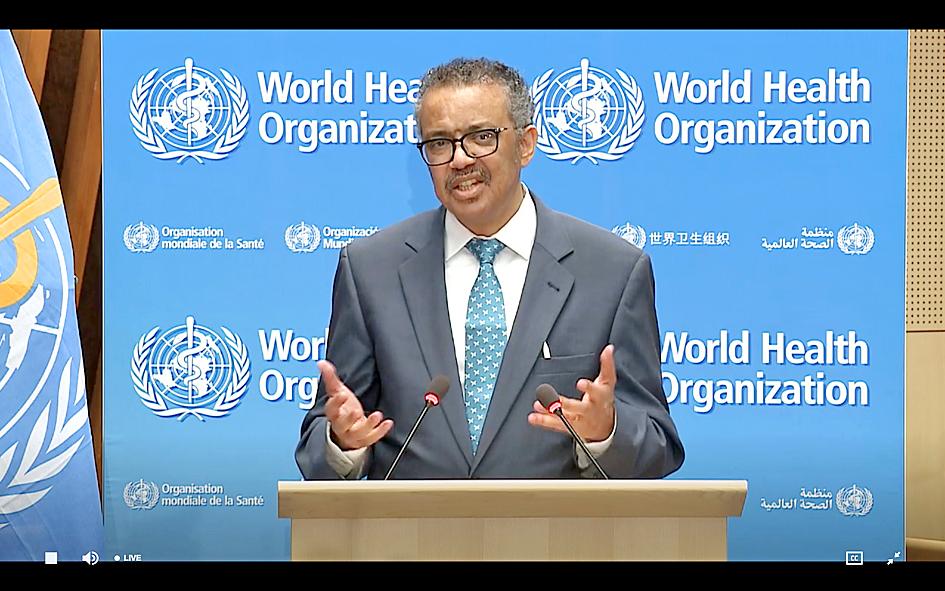At the start of their first-ever virtual World Health Assembly (WHA), WHO member states agreed to delay a controversial discussion on granting Taiwan observer status until later in the year.
The agreement came after WHO Director-General Tedros Adhanom Ghebreyesus pledged to launch an independent probe to review the coronavirus pandemic response as soon as possible, and Chinese President Xi Jinping (習近平) announced that China would provide US$2 billion over two years to fight the coronavirus pandemic and its economic fallout.
Despite the US and other members stepping up pressure in recent days, the WHA unanimously agreed to postpone a decision on observer status for Taiwan — a move vehemently opposed by Beijing — to avoid diverting attention from the COVID-19 pandemic.

Photo: AFP / WHO
Tedros had opened the two-day virtual meeting by warning there was still “a long road to travel” before the pandemic is contained, saying that the majority of the world’s population remains susceptible to the virus.
Tedros said the pandemic has exposed critical fault lines between countries that could jeopardize stopping the virus.
“Science has been hailed and scorned, nations have come together as never before and geopolitical divisions have been thrown into sharp relief,” he said.

Photo: AFP / WHO
The WHO is committed to “transparency, accountability, and continuous improvement,” Tedros said.
The EU’s 27-member bloc and other countries called for an independent evaluation of the WHO’s initial response to the pandemic “to review experience gained and lessons learned.”
The EU resolution proposes that the independent evaluation should be initiated “at the earliest appropriate moment” and should, among other issues, examine “the actions of WHO and their timelines pertaining to the COVID-19 pandemic.”
Tedros said that he welcomed the proposal for an independent evaluation of the global response to COVID-19, including the WHO’s coordinating role.
He also promised to “initiate an independent evaluation at the earliest appropriate moment to review experience gained and lessons learned, and to make recommendations to improve national and global pandemic preparedness and response.”
Xi defended his government’s actions, saying that China had provided all relevant outbreak data to the WHO and other countries, including the virus’ genetic sequence, “in a most timely fashion.”
“We have shared control and treatment experience with the world without reservation,” Xi said. “We have done everything in our power to support and assist countries in need.”
Xi said he also supports the idea of a comprehensive review of the global response to COVID-19.
“This work should be based on science and professionalism, led by WHO and conducted in an objective and impartial manner,” he said.
He said the US$2 billion would be to support COVID-19 response efforts, including economic and social development, particularly in developing countries.
Meanwhile, in her video address, German Chancellor Angela Merkel said countries need to work together to overcome the pandemic.
“No country can solve this problem alone,” she said.

INVESTIGATION: The case is the latest instance of a DPP figure being implicated in an espionage network accused of allegedly leaking information to Chinese intelligence Democratic Progressive Party (DPP) member Ho Jen-chieh (何仁傑) was detained and held incommunicado yesterday on suspicion of spying for China during his tenure as assistant to then-minister of foreign affairs Joseph Wu (吳釗燮). The Taipei District Prosecutors’ Office said Ho was implicated during its investigation into alleged spying activities by former Presidential Office consultant Wu Shang-yu (吳尚雨). Prosecutors said there is reason to believe Ho breached the National Security Act (國家安全法) by leaking classified Ministry of Foreign Affairs information to Chinese intelligence. Following interrogation, prosecutors petitioned the Taipei District Court to detain Ho, citing concerns over potential collusion or tampering of evidence. The

Seventy percent of middle and elementary schools now conduct English classes entirely in English, the Ministry of Education said, as it encourages schools nationwide to adopt this practice Minister of Education (MOE) Cheng Ying-yao (鄭英耀) is scheduled to present a report on the government’s bilingual education policy to the Legislative Yuan’s Education and Culture Committee today. The report would outline strategies aimed at expanding access to education, reducing regional disparities and improving talent cultivation. Implementation of bilingual education policies has varied across local governments, occasionally drawing public criticism. For example, some schools have required teachers of non-English subjects to pass English proficiency

‘FORM OF PROTEST’: The German Institute Taipei said it was ‘shocked’ to see Nazi symbolism used in connection with political aims as it condemned the incident Sung Chien-liang (宋建樑), who led efforts to recall Democratic Progressive Party (DPP) Legislator Lee Kun-cheng (李坤城), was released on bail of NT$80,000 yesterday amid an outcry over a Nazi armband he wore to questioning the night before. Sung arrived at the New Taipei City District Prosecutors’ Office for questioning in a recall petition forgery case on Tuesday night wearing a red armband bearing a swastika, carrying a copy of Adolf Hitler’s Mein Kampf and giving a Nazi salute. Sung left the building at 1:15am without the armband and apparently covering the book with a coat. This is a serious international scandal and Chinese

NEGOTIATIONS: The US response to the countermeasures and plans Taiwan presented has been positive, including boosting procurement and investment, the president said Taiwan is included in the first group for trade negotiations with the US, President William Lai (賴清德) said yesterday, as he seeks to shield Taiwanese exporters from a 32 percent tariff. In Washington, US Trade Representative Jamieson Greer said in an interview on Fox News on Thursday that he would speak to his Taiwanese and Israeli counterparts yesterday about tariffs after holding a long discussion with the Vietnamese earlier. US President Donald Trump on Wednesday postponed punishing levies on multiple trade partners, including Taiwan, for three months after trillions of US dollars were wiped off global markets. He has maintained a 10 percent